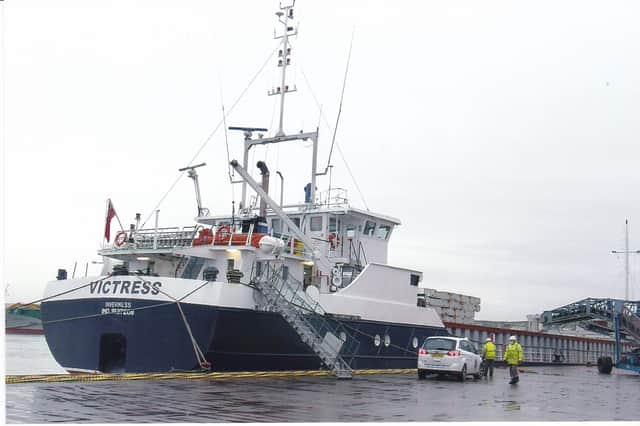Shipping Lines


“Cauld winter was howlin’ o’er moor and o’er mountain and wild was the surge o’er the dark rolling sea” – so run the words of the well-known and often sung Scots song and aptly described the weather conditions on Boxing Day when breaking waves driven by a raw, south-easterly wind crashed on to the sands of Montrose bay. By early to mid-afternoon the tall tower of Scurdie Light was beginning to disappear in the gathering mirk.
It was a reminder of days long past when many ships would have run for shelter. My cuttings books for the 1950s and early 60s contain numerous reports of incidents where stormy weather caused havoc in the North Sea and beyond.
Advertisement
Hide AdAdvertisement
Hide AdOver the Christmas period the coasters Astrid and Wilson Odra were safely berthed on opposite side of the South Esk. The previous days had seen several departures including the Anja, Victress, GT Auriga and Scot Carrier. In addition, there had been movements of anchor handlers and Seagreen wind farm service vessel Acta Centaurus plus tenders at the terminal at the South Quay.
While the Astrid moved across the river, the Victress departed for Port Ellen. Clearing the port on 23rd December, arriving at her destination around noon on Boxing Day, having sailed northwards via the Pentland Firth, then passing down the Minch, prior the reaching Islay. Although not being alongside a quay during Yuletide, the crew were probably looking forward to a well-earned seasonal break over Hogmanay in the Western Isles. Alas, it was not to be – she sailed from Port Ellen on the morning of 31st December bound for Ostend!
The present Victress was previously named Scot Carrier, the name now carried by the timber-laden vessel seen in Montrose recently. To complicate matters even further, a Victress appears on the global AIS system to be trading around the eastern Mediterranean trading between ports in Turkey, Russia, Ukraine and Abu Qir(Egypt). Both coasters named Victress have been seen in Montrose as have two Scot Carriers. Usually when ships are sold out of a particular region they change names for obvious reasons. Worth mentioning, both the recent Victress and Scot Carrier are registered in Inverness.
One of the last coasters of the year to berth at the port was Wilson Odra which brought a shipment of used oilfield tubulars from the Norwegian port of Mongstad. She was built in 1999 in Tulcea, Romania for a well-known German shipping company RMS, located in Duisburg on the Rhine.
Advertisement
Hide AdAdvertisement
Hide AdOwners Wilson ASA have added several vessels to their existing fleet now totalling 130-plus coastal and short sea vessels. One of the more recently seen in Montrose is the already mentioned Wilson Odra which is named after the river (Oder) marking the border between Germany and modern-day Poland.
The new acquisitions to this Norwegian owned, chartered and managed commercial fleet, mainly registered in Bridgetown, Barbados have come from Rhenus Maritime Services, which was formed around 70 years ago. Their trading area goes far beyond the Rhine stretching from the Samai Canal in the region of the Finnish Lakes, through the North and Baltic Seas and on occasion stretches to the Mediterranean.
The parent company, initially known as Paal Wilson, entered into a joint venture with Jebsens, a famous name in Nordic shipping, in 1993 with the name Wilson Eurocarriers emerging.
Today, the enlarged group operates vessels ranging from 1,500-ton coasters up to 8,350-ton bulk carriers from their offices in Bergen. Most of their ships carry the name “Wilson” painted in bold white lettering on both sides of their light blue hulls and are named with the “Wilson”-prefix, while their older units’ names end in “o”.
Caption: The Victress loading on the South Quay during a recent call.